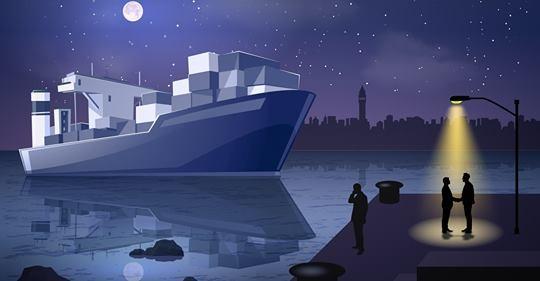
The Cocaine Cowboys
In a nondescript shopping mall in the industrial outskirts of Venice, a major new European drug route is taking shape.
Antonino Vadalà, a hot-headed man who dominates the room, sizes up his potential partner, a local businessman he hopes will help him import hundreds of kilos of cocaine into northern Italy and Slovakia.
The plan is to use legal goods to disguise the drug shipments.
“We load bananas, cereal, nuts, we load some bullshit,” Vadalà says. “We ship it to your company … and we pay off customs. We clear it with them when [the container] arrives.”
Vadalà, 44, a Calabrian expatriate who lives in Slovakia, is a member of the second generation of Italian men to leave their mafia-dominated hometown to settle in the Central European nation. Officially, he raises cattle and sells beef. But prosecutors in Venice allege that Vadalà is also a drug trafficker who worked with the ‘Ndrangheta, one of the world’s most powerful organized criminal groups, to open a major new cocaine route into Europe.
This report is based on two indictments from courts in Venice and Milan and interviews with detectives and prosecutors. Journalists from IRPI and Investigace.cz, both member centers of OCCRP, began looking into Vadalà in 2016 in collaboration with Ján Kuciak, a Slovak investigative reporter who had come across Vadalà’s name in his work.
Kuciak found that a young female assistant of Slovak Prime Minister Robert Fico had once co-owned a business with Vadalà — and that the Italian had allegedly scammed the European Union out of 120,000 euros in agricultural subsidies.
On Feb. 21, 2018, Kuciak and his fiancee, Martina Kušnírová, were killed in their home in a Slovak village. Within days, OCCRP and its member centers published several stories they had been working on with him. Now, a year later, reporters are in a position both to dig deeper into the circumstances of Kuciak’s death and to continue his work. In particular, they’ve been able to trace the rise and fall of Vadalà’s ambitious Venetian enterprise.
A New Route
The shopping mall meeting where Vadalà talked about stashing cocaine amid legal imported goods took place in September 2014.
The mall, Valecenter, was in a strategic location. Three highways crossed nearby: one leading to the airport, one heading north toward Austria, and one going southwest. If you drove far enough in that direction you’d reach Reggio Calabria, the Italian province where Vadalà’s family is based and where the ‘Ndrangheta coalesced as a mafia syndicate in the late 1800s.
Any of the highways could provide a quick escape in case lookouts spotted police.
It was here, to Venice, that Vadalà wanted to import loads of cocaine across the ocean from Ecuador and Peru. The commercial harbor here was less strictly policed than the one in Calabria. It also had two other advantages: It was free from the dominance of any one mafia clan, and it served as a home base for Francesco Giraldi, the import-export entrepreneur Vadalà was teaming up with.
While Vadalà and Giraldi talked business, each was supervised by a senior ‘Ndrangheta member: Leo Zappia, 61, was there to guide Vadalà; and Vittorio Attilio Violi, in his mid-50s, was overseeing Giraldi.
While the four men met, two others were on guard, looking for any sign of law enforcement.
Violi — sometimes called “peg leg” for the limb he lost after a 2010 shootout in Calabria — led the Venetian operations of the Morabito, a Calabrian clan that operates under the ‘Ndrangheta’s umbrella. The group is also known as Tiradrittu (the straight-shooters) after the nickname bestowed on its founder’s father for his willingness to shoot his enemies and his accuracy when he did so.
Violi served as an important ‘Ndrangheta chief in Venice, making it his job to export the syndicate’s practices and operations from Calabria to the northern Italian port city and surrounding province.
It’s in that capacity that he had been scouring Venice for an import-export partner to handle Vadalà’s proposed drug shipments. That’s how he met Giraldi.
Zappia, “the white-haired one” in attendance as Vadalà’s more senior adviser, is ‘Ndrangheta aristocracy: His uncle, Giuseppe Morabito, was one of the most powerful bosses the syndicate ever had, and once led one of its three major mandamentos, or branches. The elderly Morabito is now serving a life prison term, but his clan’s power is still felt all over the world through his disciples — among whom Zappia is king.
“I want to ship 200, 300 kilos at a time,” Vadalà said to Giraldi. “You understand? Minimum 200, 300.” This would be enough cocaine to fill the trunks of several cars, and he needed to know whether Giraldi, the importer and exporter, could really deliver enough Latin American fruit or other legal goods to conceal such a volume.
Vadalà was particularly interested in legitimate products from Ecuador and Peru, two countries where he had existing contacts and from which he was planning to secure his supplies.
From there, the drugs could be ushered through Giraldi’s import business in Venice (via shipments ordered by Vadalà’s Slovak company) and end up either in Italy or in Slovakia.
 Videos
Videos Photos
Photos




Write a comment